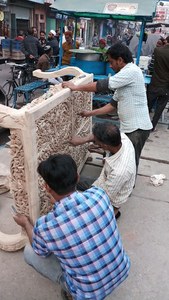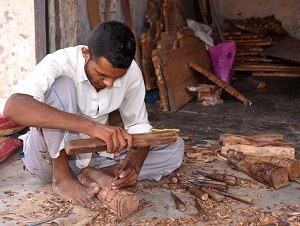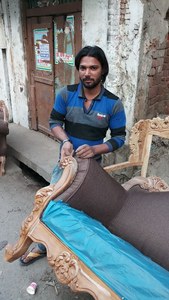Days to Derail Work of Two Generations?
Strap: How an internet shutdown hurt a family woodwork business.
Saharanpur, Uttar Pradesh: It was reportedly Bahlul (Bahlol) Lodi, the founder of Lodi dynasty, who in the 15th century first settled some Afghani craftsmen and their families on the outskirts of the old town in Saharanpur. Today, this area houses the Lakdi Market, home to world-famous wood art and handicrafts. From large fretwork screens and doors to trays, bowls and trinket boxes, these intricately carved wooden objects are called for from as far as Europe, the Middle East and Australia. The woodworking industry is the mainstay of thousands of artists, workers and entrepreneurs here, many of whom are part of small mom-and-pop operations.
 |  |  |  |
|---|---|---|---|
| Craftsmen at Furqan Handicrafts in Saharanpur | |||
Mohammad Aarif, 28, heads one such business which has been in the family since two generations. Founded by his father four decades ago, Furqan Handicrafts has survived several challenges, such as rising prices of the fast exhausting raw material and middlemen, but the losses caused by a 10-day-long internet shutdown jolted him. He lost around Rs 7 lakh ($10,900) during this time. Six months on, he is still dealing with the repercussions, uncertain if he would ever recover the money.
Dalits and Thakurs in Shabbirpur village of Saharanpur district had their daggers drawn since violence first broke out in the village on May 5. The increasing friction led to a revenge cycle of violence, and subsequently to indefinite suspension of internet services on May 24, which went on till June 2, under the orders of the district magistrate to avoid rumour-mongering and hate messages being circulated on social media and messaging apps. The suspension of services in this west Uttar Pradesh city brought life to a standstill and Aarif’s business is just one of those which suffered dramatic losses during this one week.
Furqan Handicrafts is famous for its handicraft items and furniture, both in the country and abroad. Their products go as far as Malaysia, Finland and China. Aarif uses his mobile to make payments for the raw materials as he travels a lot, and this helps him conduct his business on the go.
“We have employed around 20 workers,” says Aarif. When the shutdown came into effect without warning on May 24, he had only around Rs 20,000-30,000 ($310-470) cash in hand. “Can you imagine running a business of this size, with a weekly turnover of Rs 10 lakhs, with so little cash in hand and having the liability of over 20 families on your head?” Aarif asks. “I ran out of cash on May 26 and then the real problems began. The banks were closed and the internet was shut down. We were left with no options. The situation was so tense outside that we could not even think of going to other districts to transact or to even our own banks when they eventually opened after two days,” the businessman says.
Moreover, Furqan Handicrafts has been accepting a good chunk of their orders online - either through their website or on WhatsApp. So the shutdown also affected the demand side of the business adversely. All the little consolatory lies he told himself to steel against the mounting panic didn’t help for long with the shutdown stretching on indefinitely. “I told my workers that the media said the situation would return to normal soon, and that helped us keep calm initially. We were hopeful that we would be able to conduct transactions in the next two days, but the situation worsened when the shutdown continued for over a week,” Aarif says.
“Our suppliers refused to sell us the raw materials without being paid first. Sometimes we may get some materials on loan, but most times only money does the talking. The chemicals that we get from Delhi have to be paid for fully in advance. We had more difficulties when we weren’t able to move our finished product. They were just lying there, collecting dust, and we incurred further losses in re-polishing them. And we were not able to pay our workers for the hours they had put in,” Aarif recalls.
It was not just his business that suffered, his employees felt the sting of the shutdown as well. Najeer Ahmad, a woodworker at Furqan Handicrafts, says that everything was normal in the beginning but situation started worsening after two days. “After the second day, work started slowing down and eventually, stopped completely. Our boss told us that we couldn’t get any raw materials because we weren’t able to pay the suppliers. Whatever little materials we had in the workshop, we used up, but then when there was none left, there was no work… since there was no work, there was no money. The boss usually settles our wages at the end of every week and gives us walking-around money every day. Without either of these, it became quite difficult to manage.”
Another of his employees, Rashid, was able to weather the shutdown because he had some cash lying around at home. “Aise to jumme ke jumme hisaab ho jaata hai (Usually, we get paid every Friday).” So, even though he wasn’t paid that Friday like he usually is, he made do. But he still lost wages because of the lack of work during that week.
“We have lost money in lakhs already. If something like this were to happen again it would ruin us,” says Aarif. But he still manages to see the silver lining in this suffering, and is glad that he did not lose his clients. “Allah ka shukar tha ki hamara koi bhi client toota nahi. Nuksaan ki bharpaayi to ab tak nahi ho paayi hai, lekin Allah chahega to jald hi ho jayegi (Thank god that we didn’t lose any of our clients. We haven’t been able to recover the losses yet, but god willing, we will be able to make up).”
Mahesh Kumar Shiva is a Lucknow - based freelance writer and a member of 101Reporters.com, a pan-India network of grassroots reporters. With inputs from Saurabh Sharma, a Lucknow-based reporter.
Shutdown stories are the output of a collaboration between 101 Reporters and CIS with support from Facebook.


